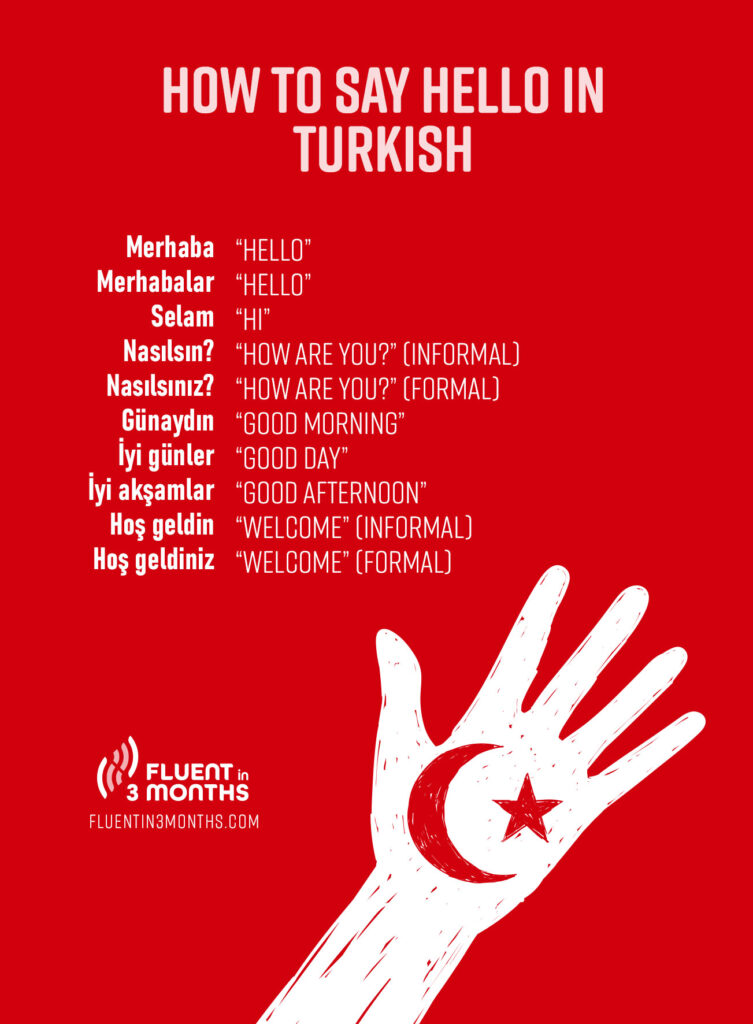Easy methods to Say Hey in Turkish
Merhaba is the most typical strategy to say “hi there” in Turkish. Nevertheless it’s removed from being the one one. Relying on the context, you’ll additionally hear the extra informal selam, the welcoming hoş geldiniz, or the morning-specific günaydın.
As a local speaker, I’ve rounded up other ways to say hi there, how to answer hi there in Turkish, and different widespread greeting phrases. Right here is an summary of what we’ll cowl:
| English | Turkish | Audio |
|---|---|---|
| “Hey” | Merhaba | |
| “Hey” | Merhabalar | |
| “Hello” | Selam | |
| “How are you?” (casual) | Nasılsın? | |
| “How are you?” (formal) | Nasılsınız? | |
| “Good morning” | Günaydın | |
| “Good day” | İyi günler | |
| “Good afternoon” | İyi akşamlar | |
| “Welcome” (casual) | Hoş geldin | |
| “Welcome” (formal) | Hoş geldiniz |


Merhaba: The Most Widespread Turkish Greeting
Why Do Turks Say Merhaba?
Selam: A Extra Informal Approach of Saying Hey in Turkish
Merhaba or Selam: Which One Ought to You Use?
Selamün Aleykum, Aleyküm Selam: Non secular Methods of Saying Hey
Turkish Greetings for Each Time of Day
Günaydın: “Good morning” in Turkish
- Günaydın! – “Good morning!”
- Günaydın! Kahve ister misin? – “Good morning! Would you want some espresso?”
- Çok iyi olur! – “That will be nice!”
İyi Akşamlar: “Good Afternoon” in Turkish
- Merhaba, iyi akşamlar. – “Hello, good afternoon.”
- İyi akşamlar, nasılsın? – “Good afternoon, how are you?”
- İyiyim, sen? – “I’m good, and also you?”
İyi Günler: “Good Afternoon” or ”Good Day” in Turkish
Easy methods to Say Welcome in Turkish
How Do Turks Greet Every Different?
Handshake: The Common Greeting
Cheek Kisses: For Mates and Household
Kissing Fingers: A Bayram (Eid) Custom
How Do You Reply to Merhaba?
Nasılsınız? – “How Are You” in Turkish
The most typical responses to nasılsınız, nasılsın, naber or napan are iyiyim sen (“I’m superb and also you?”) or iyiyim teşekkürler (“I’m superb, thanks”). Thanks in Turkish goes a great distance!
Tanıştığımıza Memnun Oldum (“Good to Meet You”)
Say Merhaba to Studying Turkish
Try our favourite Turkish assets for e-book suggestions, dictionaries, and Turkish studying web sites — you’ll quickly transfer past merhaba!

